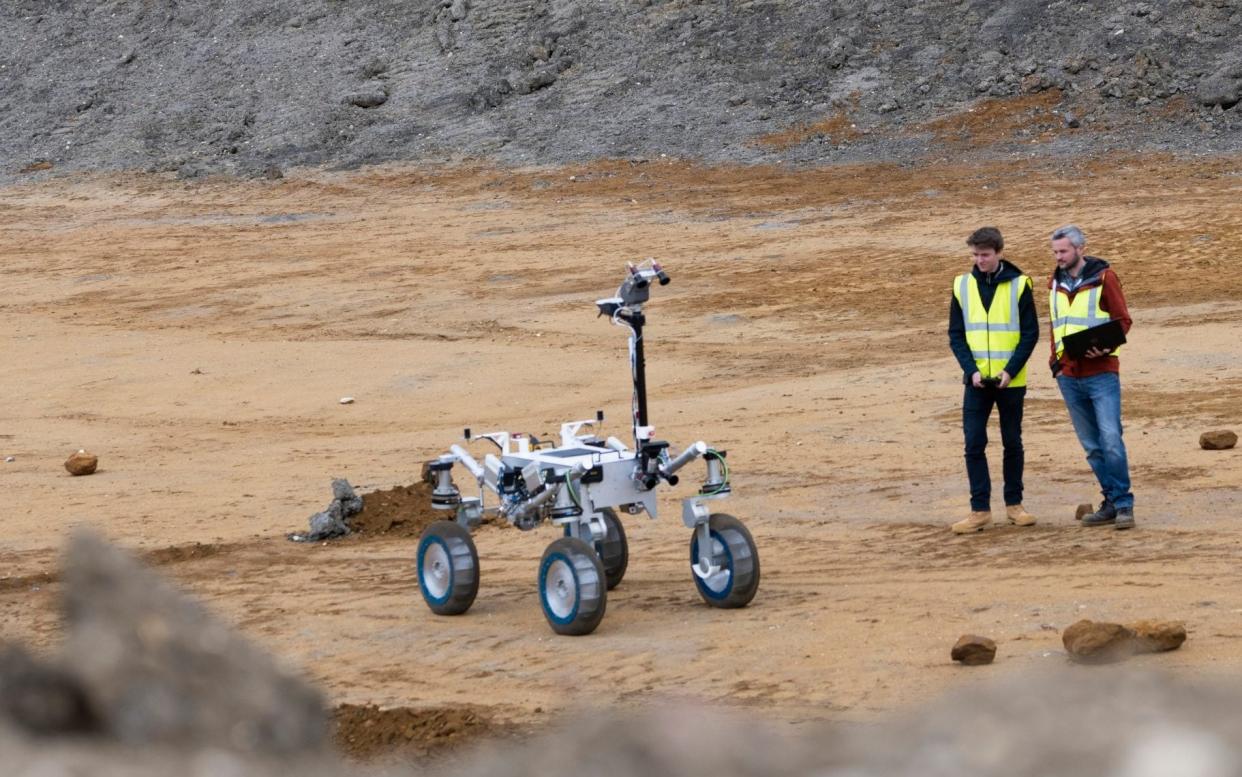British rover dropped for Mars mission could be used on the Moon

A British-built Mars rover which was dropped by Nasa and the European Space Agency (Esa) could be sent to the Moon to build lunar habitats.
The Sample Fetch Rover, which was built by engineers at Airbus in Stevenage, Hertfordshire, was designed to collect rock samples on the Red Planet for transportation back to Earth.
But it was removed from the mission after Nasa and Esa were forced to make spending cuts when Roscosmos, the Russian space agency, pulled out of several missions because of the Ukraine war.
The project has already cost Britain £22.7 million, but the rover team is now hopeful it could instead be sent to the Moon, to help construct a space base, or explore areas that are too dangerous for humans.
Last week it was put through its paces in a quarry near Milton Keynes, where controllers showed it can navigate autonomously between points, mapping the terrain as it goes, and manoeuvring around obstacles.
Ben Dobke, the project lead for the rover, said: “The technology on the rover could be adapted for use anywhere you might need an autonomous vehicle.
“Lots of the very hard things, like navigating on another world, are still the same for the Moon, so you could use it for building habitats or navigating to regions with extreme temperatures, or anything you want to do more safely.
“The wheels and the chassis could be adapted relatively easily for the lunar surface.”

The original mission aimed to bring back soil and rock samples which are currently being collected on Mars by Nasa's Perseverance rover, in a project which could prove definitively that life once existed on the Red Planet.
In July, Nasa announced that the Perseverance rover will take the samples to the launch site itself.
The US Space Agency is also sending two new helicopters as a backup, which will be scrambled if Perseverance runs out of power and is forced to abandon its load.
The mission change has left engineers looking for a new use for the Sample Fetch Rover which has already taken four years to design and build. Experts said that the sample fetch rover could also be useful for keeping humans safer on Earth.
Spin-out technologies
Adam Camilletti, Space Systems Lead from the UK Space Agency, and former engineering manager for the Sample Fetch rover said: “I would absolutely like to see the rover being repurposed for the Moon, or a future Mars mission, but the spin-out technology could also be used here on Earth.
“If you’re mining or prospecting and you’ve got underground tunnels, and you need to check their integrity then sending autonomous rovers down there to do that inspection keeps humans out of danger.
“When we send these rovers to Mars they can't use GPS so they have to localise themselves, they look at the terrain and work out where they are. When you are in a GPS-deprived environment being able to say ‘I am in this location’ that’s a huge advantage, and the UK has really got that expertise now.”
The ESA will apply for funding for projects from European ministers in November and is expected to call for the rover to be repurposed for the Moon.
Russian issues
Issues with Russia have also led to the postponement of the ExoMars mission, which would have seen the 'Rosalin Franklin' rover sent to Mars to hunt for life.
Dr Camilletti added: "For me, and a lot of people who have worked on both the Rosalin Franklin and Sample Fetch rovers, it's personally quite a tough time, but you have to keep in mind what's going on in Ukraine and how people are suffering there.
"I actually think there is a future for this, and all the expertise and knowledge that we've gained is a really good investment for the future."

